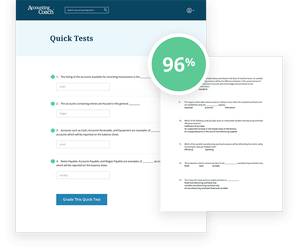For multiple-choice and true/false questions, simply press or click on what you think is the correct answer. For fill-in-the-blank questions, press or click on the blank space provided.
If you have difficulty answering the following questions, read our In-Depth Explanation for this topic.
Debit
Credit
Debited
Credited
Debit
Credit
Debit
Credit
Journal
Ledger
Cash Is Received
Revenues Are Earned
Already
Not Yet
Already
Not Yet
Debtor
Vendor

Get Our Premium Bookkeeping Test Questions When You Join PRO
Receive instant access to our entire collection of premium materials, including our 1,800+ test questions.
View All PRO FeaturesFeatures
Free
PRO
Read 3,034 Testimonials